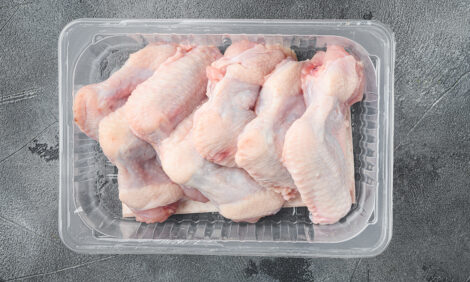



Effect of Coccidia Challenge and Natural Betaine Supplementation on Broiler Chickens Fed Suboptimal Level of Methionine
Dietary betaine supplementation helped alleviate the adverse effects of a coccidiosis challenge on nutrient digestibility and performance in young broiler chickens in this experiment.The aim of the present experiment, published in Poultry Science, was to examine the effect of coccidia challenge and natural betaine supplementation on performance, nutrient utilisation and intestinal lesion scores of broiler chickens fed suboptimal level of dietary methionine.
Authors Ahmed Amerah of Danisco Animal Nutrition and Professor Ravi Ravindran of Massey University in New Zealand explain that their experimental design was a 2×2 factorial arrangement of treatments evaluating two levels of betaine supplementation (0 and 960g betaine per tonne of feed) without or with coccidia challenge.
Each treatment was fed to eight cages of eight male broilers (Ross 308) from one to 21 days of age.
On day 14, birds in the two challenged groups received mixed inocula of Eimeria species from a recent field isolate, containing approximately 180,000 E. acervulina, 6,000 E. maxima and 18,000 E. tenella oocysts.
On day 21, digesta from the terminal ileum was collected for the determination of dry matter, energy, nitrogen, amino acids, starch, fat and ash digestibilities. Lesion scores in the different segments of the small intestine were also measured on day 21.
Performance and nutrient digestibility data were analysed by two-way ANOVA. Lesion score data were analysed using Pearson chi-square test to identify significant differences between treatments. Orthogonal polynomial contrasts were used to assess the significance of linear or quadratic models to describe the response in the dependent variable to total lesion scores.
Coccidia challenge reduced (P<0.0001) weight gain and feed intake, and increased (P<0.0001) feed conversion ratio.
Betaine supplementation had no effect (P>0.05) on weight gain or feed intake but lowered (P<0.05) feed conversion ratio.
No interaction (P>0.05) between coccidia challenge and betaine supplementation was observed for performance parameters.
Betaine supplementation increased (P<0.05) the digestibility of dry matter, nitrogen, energy, fat and amino acids only in birds challenged with coccidia as indicated by the significant interaction (P<0.0001) between betaine supplementation and coccidia challenge.
The main effect of coccidia challenge reduced (P<0.05) starch digestibility. Betaine supplementation improved (P < 0.05) starch digestibility regardless of the coccidia challenge.
For each unit increase in the total lesion score, there was a linear (P<0.001) decrease in digestibility of mean amino acids, starch and fat by 3.8, 3.4 and 16 per cent, respectively. Increasing total lesion scores resulted in a quadratic (P<0.05) decrease in dry matter digestibility and ileal digestible energy.
No lesions were found in the intestine or caeca of the unchallenged treatments. In the challenged treatments, betaine supplementation reduced (P<0.01) the lesion scores at the duodenum, lower jejunum and total lesion scores compared to the treatment without supplements.
Coccidia challenge lowered the digestibility of energy and nutrients and increased the feed conversion ratio of broilers, concluded Amerah and Ravindran.
However, they added, betaine supplementation reduced the impact of coccidia challenge and positively affected nutrient digestibility and feed conversion.
Reference
Amerah A.M. and V. Ravindran. 2015. Effect of coccidia challenge and natural betaine supplementation on performance, nutrient utilization, and intestinal lesion scores of broiler chickens fed suboptimal level of dietary methionine. Poultry Science. 94:673-680.
April 2015











